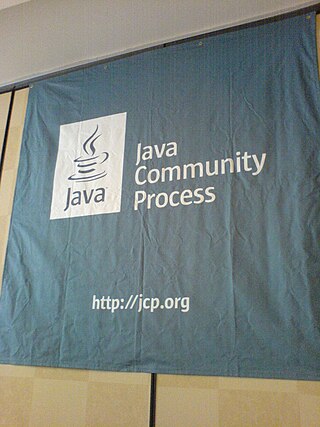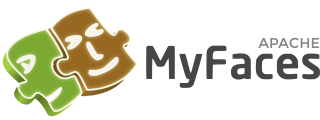
The Java Community Process (JCP), established in 1998, is a formalized mechanism that allows interested parties to develop standard technical specifications for Java technology. Anyone can become a JCP Member by filling a form available at the JCP website. JCP membership for organizations and commercial entities requires annual fees – but is free for individuals.
Web Services for Remote Portlets (WSRP) is an OASIS-approved network protocol standard designed for communications with remote portlets.
Hibernate ORM is an object–relational mapping tool for the Java programming language. It provides a framework for mapping an object-oriented domain model to a relational database. Hibernate handles object–relational impedance mismatch problems by replacing direct, persistent database accesses with high-level object handling functions.
BeanShell is a small, free, embeddable Java source interpreter with object scripting language features, written in Java. It runs in the Java Runtime Environment (JRE), dynamically executes standard Java syntax and extends it with common scripting conveniences such as loose types, commands, and method closures, like those in Perl and JavaScript.
Sakai is a free, community-driven, open source educational software platform designed to support teaching, research and collaboration. Systems of this type are also known as learning management systems (LMS), course management systems (CMS), or virtual learning environments (VLE). Sakai is developed by a community of academic institutions, commercial organizations and individuals. It is distributed under the Educational Community License, a type of open source license.
Apache Beehive is a discontinued Java Application Framework that was designed to simplify the development of Java EE-based applications. It makes use of various open-source projects at Apache such as XMLBeans. Apache Beehive uses Java 5, including JSR-175, a facility for annotating fields, methods, and classes so that they can be treated in special ways by runtime tools. It builds on the framework developed for BEA Systems Web logic Workshop for its 8.1 series. BEA later decided to donate the code to Apache.
A Java Portlet Specification defines a contract between portlets and their containers; they provides a convenient programming model for Java portlet developers. It is defined through various Java Specification Requests (JSRs).
Content Repository API for Java (JCR) is a specification for a Java platform application programming interface (API) to access content repositories in a uniform manner. The content repositories are used in content management systems to keep the content data and also the metadata used in content management systems (CMS) such as versioning metadata. The specification was developed under the Java Community Process as JSR-170, and as JSR-283. The main Java package is javax.jcr.
Apache Jackrabbit is an open source content repository for the Java platform. The Jackrabbit project was started on August 28, 2004, when Day Software licensed an initial implementation of the Java Content Repository API (JCR). Jackrabbit was also used as the reference implementation of JSR-170, specified within the Java Community Process. The project graduated from the Apache Incubator on March 15, 2006, and is now a Top Level Project of the Apache Software Foundation.
A Technology Compatibility Kit (TCK) is a suite of tests that at least nominally checks a particular alleged implementation of a Java Specification Request (JSR) for compliance. It is one of the three required pieces for a ratified JSR in the Java Community Process, which are:

GlassFish is an open-source Jakarta EE platform application server project started by Sun Microsystems, then sponsored by Oracle Corporation, and now living at the Eclipse Foundation and supported by OmniFish, Fujitsu and Payara. The supported version under Oracle was called Oracle GlassFish Server. GlassFish is free software and was initially dual-licensed under two free software licences: the Common Development and Distribution License (CDDL) and the GNU General Public License (GPL) with the Classpath exception. After having been transferred to Eclipse, GlassFish remained dual-licensed, but the CDDL license was replaced by the Eclipse Public License (EPL).

Apache MyFaces is an Apache Software Foundation project that creates and maintains an open-source JavaServer Faces implementation, along with several libraries of JSF components that can be deployed on the core implementation. The project is divided into several sub-projects:
OpenJPA is an open source implementation of the Java Persistence API specification. It is an object-relational mapping (ORM) solution for the Java language, which simplifies storing objects in databases. It is open-source software distributed under the Apache License 2.0.
Apache CXF is an open source software project developing a Web services framework. It originated as the combination of Celtix developed by IONA Technologies and XFire developed by a team hosted at the now defunct host CodeHaus in 2006. These two projects were combined at the Apache Software Foundation. The name "CXF" was derived by combining "Celtix" and "XFire".

Apache Sling is an open source Web framework for the Java platform designed to create content-centric applications on top of a JSR-170-compliant content repository such as Apache Jackrabbit. Apache Sling allows developers to deploy their application components as OSGi bundles or as scripts and templates in the content repository. Supported scripting languages are JSP, server-side JavaScript, Ruby, Velocity. The goal of Apache Sling is to expose content in the content repository as HTTP resources, fostering a RESTful style of application architecture.

Craig L. Russell is an American software architect and author. He contributed to the book 97 Things Every Software Architect Should Know.
DataNucleus is an open source project which provides software products around data management in Java. The DataNucleus project started in 2008.

Apache Pivot is an open-source platform for building rich web applications in Java or any JVM-compatible language. It is released under the Apache License version 2.0.
The JBoss Enterprise Application Platform is a subscription-based/open-source Java EE-based application server runtime platform used for building, deploying, and hosting highly-transactional Java applications and services developed and maintained by Red Hat. The JBoss Enterprise Application Platform is part of Red Hat's Enterprise Middleware portfolio of software. Because it is Java-based, the JBoss application server operates across platforms; it is usable on any operating system that supports Java. JBoss Enterprise Application Platform was originally called JBoss and was developed by the eponymous company JBoss, acquired by Red Hat in 2006.
Apache CarbonData is a free and open-source column-oriented data storage format of the Apache Hadoop ecosystem. It is similar to the other columnar-storage file formats available in Hadoop namely RCFile and ORC. It is compatible with most of the data processing frameworks in the Hadoop environment. It provides efficient data compression and encoding schemes with enhanced performance to handle complex data in bulk.





